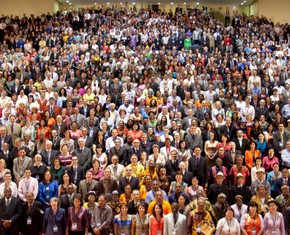The views expressed in our content reflect individual perspectives and do not represent the authoritative views of the Baha'i Faith.
Young people—especially those youth between the ages of 12 and 15—are exposed to many negative forces, but the most underestimated one is apathy.
The global Baha’i community helps these young people—who Baha’is sometimes refer to as “junior youth”—with grassroots, community-based programs that assist them in overcoming the limitations society imposes, such as lack of education, prejudice, addiction, and isolation.
Typically, many people think these kinds of problems mostly tend to afflict “underprivileged” youth—but it’s easy to forget that it’s not only underprivileged junior youth who need guidance. In this critical transition period between childhood and adulthood, everyone is affected by the forces of society—even the junior youth we normally think don’t have much to worry about.
Just because a child receives love in their home, a good education at school, and has enough material resources available does not mean that they already have everything they need. A dangerous force at work in society especially affects those from privileged, comfortable backgrounds: apathy.
I once spoke to a group of 14 to 16-year-olds in a high school, encouraging them to participate in a series of youth gatherings where we would discuss how we could improve our society, and carry out systematic action that could help our communities. Hoping to get a conversation started on the spot, I asked them: “How can youth change the society around them?”
There was dead silence. Finally, when someone spoke up, it was to say “We can’t do anything now. We’re only in high school. We still have a long way to go with our education. Then we need to find jobs, and establish a family. Once we have a place in society in which we can speak up, we can change things.”
It was a shocking moment. If the youth didn’t see themselves as capable of creating change now, at an age where we’re supposed to be our most ambitious, our most energetic, our most idealistic—then when would they?
Suddenly, the reason behind long lines of businessmen, politicians, and adults in positions of power who do nothing to help those around them became painfully clear—the apathy of the young had become the complacency, resignation and self-satisfaction of the not-so-young. How can we avoid this cycle, I wondered?
For any person, whether Baha’i or not, his youthful years are those in which he will make many decisions which will set the course of his life. In these years he is most likely to choose his life’s work, complete his education, begin to earn his own living, marry, and start to raise his own family. Most important of all, it is during this period that the mind is most questing and that the spiritual values that will guide the person’s future behavior are adopted. – The Universal House of Justice, December 2015.
Many of the youth I had been exposed to up to that point were from low-income or disadvantaged families. They struggled to get an education, worked at a very young age to bring food to the table, and were often responsible for younger siblings. Those youth knew their role in society—they bore heavy responsibilities, and had developed a mentality that allowed them to be flexible, ambitious, and still be realistic.
While it’s obviously tragically unjust that junior youth at such a young age have to struggle to survive, it’s also clear that in furnishing junior youth with less hardships and more material means, we aren’t necessarily helping them develop their independence or their spiritual maturity.
When junior youth get everything from the adults around them, it can be difficult to help them feel like they have ownership or a sense of agency in their own lives. Our society tends to think of these adolescents as empty cups ready to be filled with education—not, as the Baha’i teachings define them, as “mine rich in gems of inestimable value.” We know that education, spiritual as well as intellectual, can extract inherent gems from every young person:
… to define the fruitful years of youth exclusively as a stage of preparation would be to overlook the creative energies which are available to youth in such abundance. – The Universal House of Justice, February 1995.
The roots of this apathy and complacency in so many youth doesn’t represent a conscious choice on the part of the adults who surround them. In fact, it often comes out of love, and the desire to provide the younger generation with the comforts that weren’t afforded to those adults. Certainly, that love and those opportunities have not gone to waste—we have equipped junior youth with more skills and knowledge than any generation before them, which gives them opportunities to grow and serve the world around them in ways we could never imagine.
But it’s very important that we also make a concerted effort to give them the opportunity for spiritual growth that focuses on them developing their identity as agents of change.
In many countries, there are incredible opportunities for youth in middle school and high school that give them a chance to develop skills like public speaking, leadership, entrepreneurship and writing skills. But are we encouraging them to go further and carry those skills out into society?
With so many ready-made boxes in which to exercise their abilities, junior youth don’t always see how their skills as artists, or performers, or team leaders, can carry further into their neighborhoods, to educate younger children, to lead meaningful discussions with their friends, or to inspire movements for social change.
Because while it’s wonderful that our junior youth can be provided with an infrastructure that encourages them to develop skills, it’s also important that they learn to apply those skills to the reality around them. High school, college, and after-school activities are not always reflective of the real world, and it’s easy for youth to live in a bubble of socio-economic comfort.
If we want to raise children who will change the world, help the oppressed, fight against injustice, and unify humanity, we need to make a concerted effort to help them develop the flexibility and openness necessary for these tasks—so that as they grow older, the decision to improve their community comes organically and spontaneously from them, not from their families or their relatives, not out of a need to fulfill community service hours for school, or to have a comfortable space in which to socialize, but out of their sincere desire to be a means through which their communities grow unified, and the planet can become more spiritual:
How excellent, how honorable is man if he arises to fulfill his responsibilities; how wretched and contemptible, if he shuts his eyes to the welfare of society and wastes his precious life in pursuing his own selfish interests and personal advantages. – Abdu’l-Baha, The Secret of Divine Civilization, p. 4.
Whether we’re parents, teachers, volunteers, older siblings or friends, we each have a responsibility to help junior youth see themselves exemplifying a life of service towards others—not apathy, but altruism.
We have the means to accompany them on their ambitious plans, to encourage them to take things a step further, to not let them be discouraged by other people’s apathy. We know how talented and capable and good they are—now we can help them along the way as they discover how to apply those talents, capacities, and spiritual strengths to improve the world around them.
Junior youth are at a crucial period in their lives, the stage where they establish patterns of thought, make life-altering decisions, set the course of their futures, and solidify their personalities. Everyone who cares about the future has a responsibility to be there to help them on their path of service. Because if not now, then when?
















Comments
Sign in or create an account
Continue with Googleor